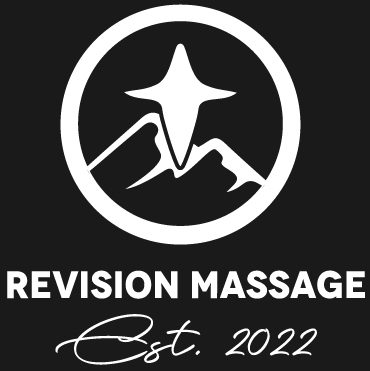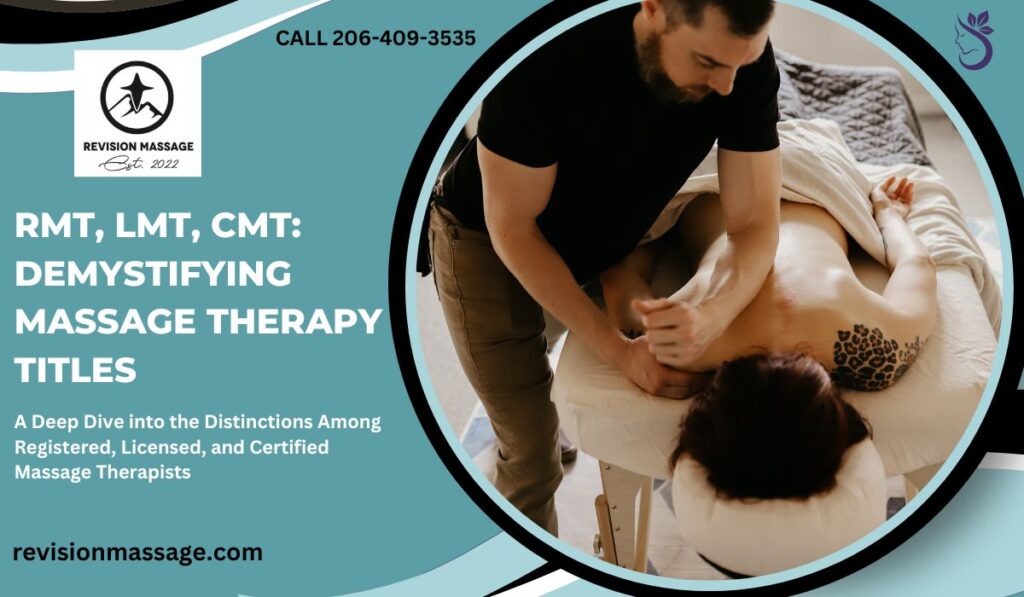A Deep Dive into the Distinctions Among Registered, Licensed, and Certified Massage Therapists
In massage therapy, there’s no shortage of titles and designations. For clients seeking a professional massage, it can be confusing to differentiate between the various titles, such as Registered Massage Therapist (RMT), Licensed Massage Therapist (LMT), and Certified Massage Therapist (CMT). This blog aims to clarify these titles and help you decide when choosing a massage therapist.
Finding a qualified and skilled therapist is the key to a truly exceptional massage experience. Look no further than Revision Massage, home to the only current Licensed Massage Therapist (LMT) in town! With a commitment to providing top-notch services, Revision Massage is your go-to destination for all your massage therapy needs.
Registered Massage Therapist (RMT)
An RMT is a massage therapist who has completed a comprehensive educational program and has met the requirements of their respective regulatory body. In some countries, like Canada, the title “Registered Massage Therapist” is used to signify a regulated healthcare professional who has met specific criteria, including completing a minimum number of training hours and passing a standardized exam[^1^].
RMTs must adhere to a strict code of ethics and maintain their registration by completing continuing education courses. They are qualified to assess and treat various musculoskeletal and soft tissue conditions, provide therapeutic and relaxation massages, and collaborate with other healthcare professionals.
Certified Massage Therapist (CMT)
A CMT is a massage therapist who has earned a certification from a recognized certification body, such as the National Certification Board for Therapeutic Massage & Bodywork (NCBTMB) in the United States[^3^]. Certification typically involves completing a certain number of educational hours, passing a certification exam, and adhering to a code of ethics.
While certification is not the same as state licensing, it demonstrates that massage therapists have met a certain level of professional competency and are committed to maintaining high standards in their practice. In some states, becoming a CMT may be a prerequisite for obtaining a massage therapy license[^4^].
When choosing a massage therapist, it’s essential to understand the differences between RMTs, LMTs, and CMTs. While each title signifies a certain level of education, training, and professional standards, the specific requirements may vary depending on the jurisdiction.
Always ensure that the massage therapist you choose meets the requirements in your area and has the appropriate qualifications to address your specific needs.
Choosing an unlicensed massage therapist leads to various issues, ranging from ineffective treatment to potentially harmful consequences.
Licensed Massage Therapist (LMT)
An LMT is a massage therapist who has met the licensing requirements of the state or jurisdiction where they practice. These requirements can vary significantly between states in the United States. Generally, to become an LMT, a massage therapist must complete a state-approved educational program, pass a licensing exam, and maintain their license through continuing education courses.
Licensed Massage Therapists (LMTs) follow the regulations set by their state’s massage therapy board, ensuring they maintain high professional standards in their practice. Their extensive training equips them with the skills to offer various massage techniques, allowing them to cater to diverse client needs. Additionally, LMTs may choose to specialize in particular modalities or focus on specific client populations, further enhancing their expertise and the quality of care they provide.
Revision Massage in Monroe stands out as the best LMT in the area due to its commitment to offering high-quality and productive massage therapy services.
Travis Maner, the LMT at Revision Massage, is a skilled professional with excellent knowledge of the body and craft, as evidenced by the positive reviews from clients who have experienced an improved range of motion, reduced pain, and overall better well-being after receiving his services].
Travis is also a Spectrum Center School of Massage graduate and a member of the American Massage Therapy Association (AMTA) and Associated Bodywork and Massage Professionals]. Focusing on deep tissue and remedial massage, Revision Massage ensures clients receive the most effective and personalized treatment possible.
Reasons why it's essential to seek massage therapy from an LMT (Licensed Massage Therapist).
- 1. Quality of Care: A licensed massage therapist (LMT) has undergone rigorous training and education, ensuring they possess the necessary skills and knowledge to provide safe, effective, and high-quality care. An unlicensed therapist may not have the same level of expertise, which can result in subpar treatment and unsatisfactory results.
- Safety Concerns: Licensed massage therapists follow strict safety protocols, such as proper sanitation, hygiene, and draping techniques, to ensure a clean and comfortable environment. Unlicensed therapists may not adhere to these standards, potentially exposing clients to health risks and an uncomfortable massage experience.
- Legal and Regulatory Compliance: Licensing is a requirement in many jurisdictions to ensure that massage therapists meet specific professional and ethical standards. By choosing an unlicensed therapist, you may be supporting a practitioner who does not comply with local regulations, which could have legal implications.
- Insurance Coverage: Many insurance companies require that a licensed professional perform massage therapy to be eligible for coverage. By opting for an unlicensed therapist, you may be unable to utilize your insurance benefits, potentially leading to higher out-of-pocket costs.
- Ethical Considerations: A code of ethics governs the professional conduct of licensed massage therapists, which includes maintaining client confidentiality and obtaining informed consent. Unlicensed therapists might not adhere to these ethical standards, potentially compromising the trust and rapport between the therapist and the client.
- Accountability: Licensing boards hold LMTs accountable for their practice, ensuring they maintain their skills and adhere to professional standards. Unlicensed therapists may not be subject to the same oversight, which can result in a lack of accountability and potential malpractice.
In summary, choosing an unlicensed massage therapist can lead to issues concerning the quality of care, safety, legal compliance, insurance coverage, ethics, and accountability. To ensure the best possible massage experience and protect your well-being, it’s crucial to seek therapy from a licensed professional with the necessary qualifications and expertise
Revision Massage is your #1 destination for professional massage therapy in the greater Snohomish area.
Your #1 Monroe LMT is waiting to treat your pain, injuries, and more at Revision Massage. At Revision Massage, we strive to provide each of our clients with a personalized experience that meets their needs.
We now accept PIP: Personal Injury Protection (PIP)
Learn more: Why a Licensed Massage Therapist is the Right Choice for Injuries.

